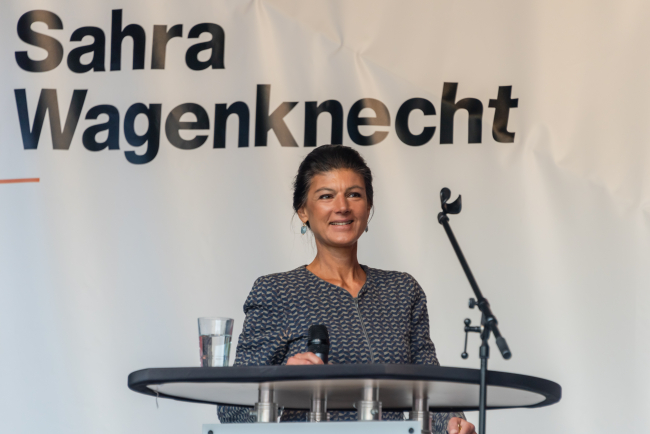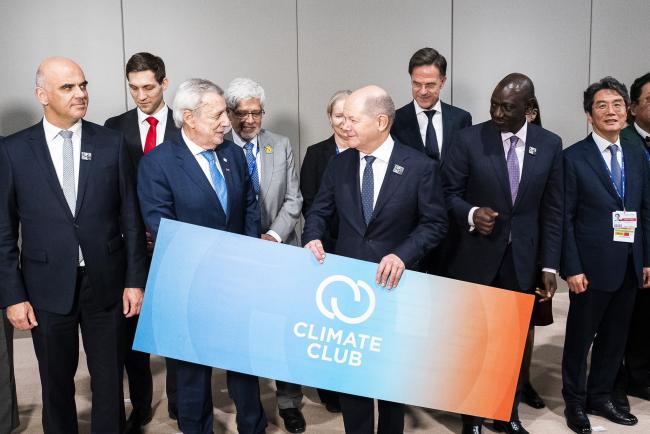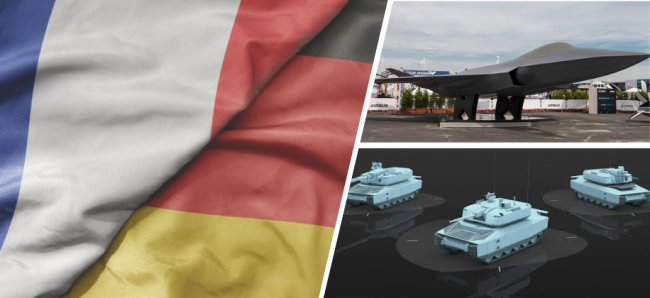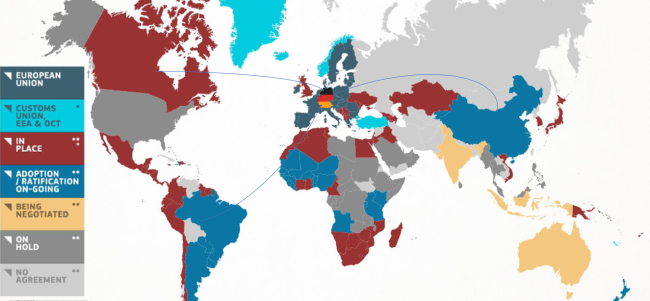Germany
An in-depth analysis of Germany's trajectory through its foreign and European policies, its relations with France, its economy and its domestic politics, offering a perspective on the country and its role in the world.
Related Subjects

Neither Left nor Right, but Both? The Sahra Wagenknecht Alliance (BSW) in the Wake of European Elections
The 2024 European elections not only provided the occasion for a new German party, the “Bündnis Sahra Wagenknecht” (BSW), to emerge but also to obtain 6.2% of the vote.
German Ports and China: How to Reconcile Openness, Resilience and Security?
Germany is dependent on its ports for the smooth running of its open economic model and has benefited from globalization in recent decades when the internationalization of its value chains strengthened its competitiveness. Yet, with today’s hardening geopolitics, the vulnerabilities of Europe’s leading economic power are becoming apparent.

AfD’s Foreign Policy Between Disengagement in the West and Partnership in the East
The Alternative for Germany (AfD) was formed in 2013 in the context of the currency crisis as an “alternative” to the Merkel government’s policy of rescuing the euro. Since then, the party’s platforms for the European elections in 2014, 2019 and 2024 have become increasingly radical.
Germany’s Strategy on Climate Foreign Policy: Balancing Sustainable Development and Energy Security
With the war in Ukraine, Germany’s “traffic light” coalition government has had to adapt its climate policy to the upheavals caused by this war, which has turned its economic, energy, and military model upside down. Against a backdrop of high energy costs and increasing calls for reshoring in Europe, German industry is looking at how to maintain its competitiveness while decarbonizing its industry.
Troubled Twins: The FCAS and MGCS Weapon Systems and Franco-German Co-operation
The FCAS (Future Combat Air System) and the MGCS (Main Ground Combat System) represent the latest chapter in a more than seven decades-long history of Franco-German defense co-operation.
Towards a New European Trade Strategy in Times of Geopolitical Upheaval: The German Perspective
As one of the most successful trading blocs, the EU sees itself confronted with the erosion of the global rules-based trading system and trade becoming increasingly weaponized.
Zeitenwende: The Bundeswehr’s Paradigm Shift
Russia’s invasion of Ukraine on February 24, 2022, marked a turning point in German defense policy. After thirty years of military downsizing, the Bundeswehr found itself at an extremely low capability level just as a high-intensity war involving a great power was breaking out on Europe’s doorstep for the first time since 1945. Chancellor Olaf Scholz’s response was to embrace this “turning point” (Zeitenwende) by launching a major program to reequip Germany’s armed forces.
The End of a Happy Parenthesis. How the War in UkraineI Is Forcing Germany to Rethink Its Model
The period of peace, economic prosperity, and political stability that Germany has experienced since the end of the Cold War ends with the Ukrainian war. The shock wave of this conflict particularly hit its economy and thereby undermines the foundations on which Germany had based its power, its international influence and established its identity.
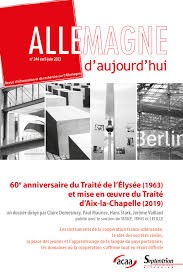
DOSSIER - 60th anniversary of the Elysée Treaty (1963) and implementation of the Treaty of Aachen (2019): where do Franco-German relations stand?
On January 23, 2023, France and Germany celebrated the 60th anniversary of the Élysée Treaty. This is an opportunity for us to analyze the state of relations between the two countries, and the contribution made by the Treaty of Aachen, which was added in 2019.

The Cumbersome Legacy of the SPD’s Policy Towards Vladimir Putin’s Russia
The Social Democratic Party of Germany (SPD) looks back with pride on the history of its Ostpolitik, which it sees as having paved the way for German reunification. With the firm will to continue this Ostpolitik after the end of the Cold War, SPD politicians of the last 20 years have, within the framework of their government responsibility, focused on a partnership with Russia, which had the goal of contributing to the democratization of Russia through bilateral trade and mutual interdependence.

DOSSIER - 60th anniversary of the Elysée Treaty (1963) and implementation of the Treaty of Aachen (2019): where do Franco-German relations stand?
On January 23, 2023, France and Germany celebrated the 60th anniversary of the Élysée Treaty. This is an opportunity for us to analyze the state of relations between the two countries, and the contribution made by the Treaty of Aachen, which was added in 2019.
Attention to the Periphery? Germany and the Pacific Island States
In September 2020, Germany adopted policy guidelines for the Indo-Pacific that comprehensively set out its approach towards this increasingly important region, seeking to diversify partnerships beyond China.

French Foreign Policy in the Age of Polycrisis
Under the presidency of Emmanuel Macron, France has set itself the goal of strengthening its international presence, being more proactive and defining the European reform agenda. However, the French room for manoeuver is limited.
Germany and the Eastern Partnership after the Ukraine Crisis
The conflict in and about Ukraine has catapulted the European Union's Eastern Partnership (EaP) into the limelight of international attention. Belittled as a bureaucratic and technical policy instrument, the European Neighbourhood Policy and the EaP as its Eastern regional dimension have within the course of a few months gained unexpected geopolitical significance.
Deploying the Bundeswehr: more transparency, more flexibility, but Parliament’s consent remains key - The Rühe Commission’s final report
Besides the often invoked historical dimension behind Germany’s strategic culture of restraint, there are today very tangible legal reasons that prevent assertive German military interventionism (which are, of course, directly linked to the historical dimension): any intervention of the German armed forces requires the Bundestag’s consent.

Germany's Unnecessary Hegemony
Based on the realist theory of international relations, this article analyses whether Germany has any incentives to seek (regional) hegemony. It concludes that under the current systemic circumstances – in which the country's survival is ensured by the United States – Germany has no reason to become a hegemon, which is normally a strategy to escape the perils of the anarchic international system.
German Defence Policy in 2014 and beyond: Options for Change
The speeches made by several German leaders at the Munich Security Conference in early 2014, emphasized that Germany needs to be ready for greater international commitment, and without a priori excluding military instruments.
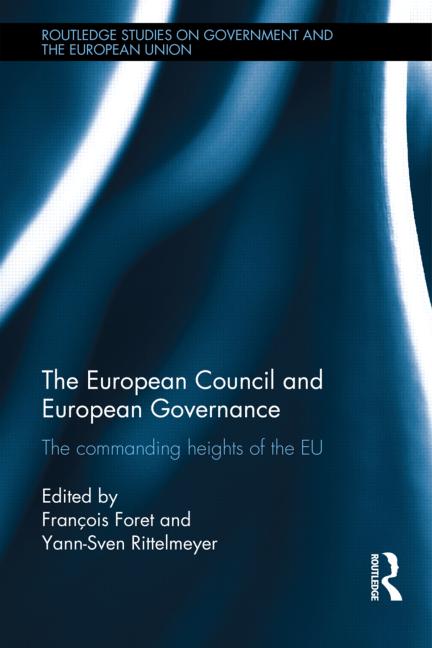
The European Council and European Governance. The commanding heights of the EU

From One Electoral Campaign to Another: Franco-German Relations in Turbulent Times
Youth Unemployment in Europe
On an initiative of the IP-Journal of the German Council of Foreign Relations (DGAP), the Study Committee for Franco-German Relations (Cerfa) of the French Institute of International Relations (IFRI) and the Polish Institute of International Affairs (PISM) are regularly publishing short contributions on a common subject, written by three experts of these institutes. The purpose of these “Weimar Triangle Analyses” is to give the French, Polish and German views on central questions of European politics and European integration.
Support independent French research
Ifri, a foundation recognized as being of public utility, relies largely on private donors – companies and individuals – to guarantee its sustainability and intellectual independence. Through their funding, donors help maintain the Institute's position among the world's leading think tanks. By benefiting from an internationally recognized network and expertise, donors refine their understanding of geopolitical risk and its consequences on global politics and the economy. In 2025, Ifri supports more than 80 French and foreign companies and organizations.







